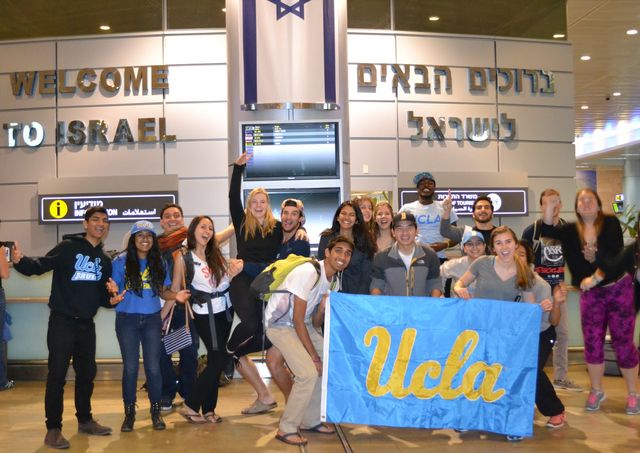As of late, UCLA has essentially emerged as a podium hosting various altercations regarding the Israeli-Palestinian conflict. On several counts — especially in light of the BDS movement — Israel has been shamed and defamed, leaving many onlookers with the impression that the state is wretched and ill-favored.
In 2014, USAC candidates were asked to pledge to not take trips to Israel with pro-Israel organizations, lest such trips cloud their judgment while making decisions in office. This sentiment is similar to that expressed during the “Rachel Beyda incident” last year, when Beyda’s competence as a potential Judicial Board member was questioned as a result of her Jewish identity.
Correspondingly, Hillel at UCLA created the Fact Finders trip, allowing primarily non-Jewish (with the exception of a few Jewish) student leaders to visit Israel and acquire information on both narratives at the scene of the controversy. In essence, Fact Finders serves as a Birthright trip of sorts for non-Jewish students, but with an added political angle.
This year’s trip took place during spring break and boasted 22 students, including juniors Sabrina Zeigler and Sujith Cherukumilli, who shared their experiences with Ha’Am. Looking in from the outside, Israel can strike one as a dangerous and intimidating place to visit, so the desire of these students to take this journey manifests their interest in learning more about Israel and the conflict.
As a Political Science major with a concentration in International Studies who has long been enamored by events in the Middle East, Cherukumilli explained, “When the opportunity to actually visit the region and learn about the conflict firsthand presented itself, I jumped on it because I knew that I would benefit from this trip in many ways and be able to broaden my perspective.”
Although also a Political Science major (as well as Society and Genetics minor), Zeigler’s fascination with Israel was more spiritually rooted: “I have always had an intense desire to learn, especially about religions and how people could have this incredible faith and these incredible cultures, but also something that creates pain and issues and even war and bloodshed,” she said.
Whether they were bathing in the Dead Sea, touring the Israeli Parliament, celebrating Purim in the streets of Jerusalem, conversing with the locals of Majdal Shams, engaging with students at Al-Quds University, or partying in Tel Aviv, these 22 trip participants experienced one of the most well-rounded and all-encompassing trips to Israel that one could take within a time frame of 9 days. As Cherukumilli said, “When we got the chance to speak with an Israeli Knesset member and a member of the PLO within 12 hours of each other, I truly saw how balanced of an experience we were getting.”
Zeigler recounted her visit to the Yad Vashem Holocaust Museum as one of her favorite parts of the trip. “[The Holocaust] was one of the most terrible tragedies of our world’s history, yet the way the museum is set up shows the light that came after all the death and pain and destruction, and to me, that was beautiful. Everyone knows the number of deaths and the unfathomable amount of people murdered due to their faith, but no one can take on that emotional burden by themselves, so you must go on, you must find something to take away from it.”
A memorable moment for Cherukumilli was getting the chance to talk to two individuals in the Gush Etzion settlement on the West Bank about their grassroots efforts to unite Israelis and Palestinians. “We spoke with an Israeli settler and a Palestinian who work together to run an organization called Roots, and the insight they offered gave me a great deal of hope that future generations will work together in a similar capacity.”
The students’ takeaways regarding the conflict was the surprising openness and understanding they encountered from the locals. As Cherukumilli said, “I was most surprised to learn that people in both Israel and Palestine on both sides of the conflict are not nearly as divided, polarized and hostile toward each other as many groups on UCLA’s campus. People living this conflict on a daily basis have more or less learned to coexist and understand the struggles of the other side; one of the most significant indicators of this sense of understanding is the type of rhetoric used by both Israelis and Palestinians. Israelis that we met with during the trip described the issue as ‘Israelis, Palestinians and terrorists (referring to Hamas),’ not affiliating Palestinians with Hamas. A resident of a kibbutz we visited along the Gaza border said that the Palestinians were her neighbors, but Hamas [members] were terrorists. I was surprised to learn that people living in the region are committed to peace and are extremely understanding toward each other, despite their long history of conflict and differences.”
Ultimately, these students were privileged to experience Israel in such a unique way and through so many distinct lenses on a personal level. “You see these things up close—[events] that you always see in the news or hear about from friends—and it’s so different up close,” Zeigler said. It is evident that Fact Finders was successful in cultivating for its participants a more inclusive perspective on issues surrounding Israel and the Palestinian Authority in an enjoyable manner.
For those planning on participating in a Fact Finders trip in the future, both Cherukumilli and Zeigler share the same piece of advice: keep an open mind. Both would also be interested in revisiting Israel in the future if given the opportunity. Zeigler even said, “I think I could live there, to be totally honest. Also, to be clear [regarding the balance of the trip], we visited Israel and Palestine as well, which was wonderful.”

